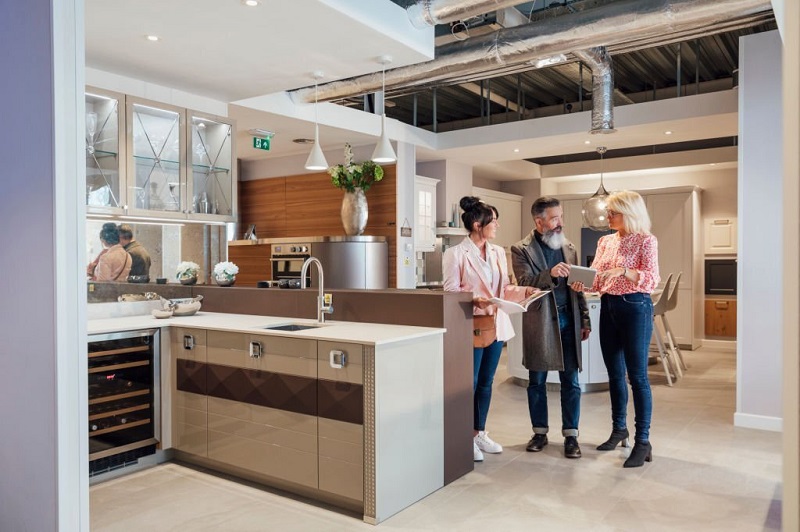Are you tired of your outdated kitchen and ready to give it a much-needed makeover? Whether you're looking to increase the value of your home or simply want to create a space that reflects your personal style, a kitchen renovation can be the perfect solution. However, with so many options and decisions to make, it can be overwhelming to know where to start. This comprehensive guide will walk you through the entire process, from planning and budgeting to selecting materials and executing your vision. With expert tips and advice, you'll be well on your way to creating the kitchen of your dreams.
#. Planning Your Kitchen Renovation
Before diving into the world of kitchen renovation, it's essential to have a solid plan in place. Start by assessing your current kitchen and determining what you like and dislike about it. Consider the following questions:
 |
Kitchen Renovation |
What is the overall style and vibe you want to achieve?
How do you use your kitchen? Is it primarily for cooking, entertaining, or both?
What are your storage needs? Do you require more or less cabinetry?
Are there any structural changes needed, such as removing walls or adding windows?
Once you have a clear vision of your ideal kitchen, create a list of must-haves and nice-to-haves to guide your decision-making throughout the process.
#. Setting a Budget
Kitchen renovations can range from a few thousand dollars to tens of thousands, depending on the scope of the project and the materials chosen. It's crucial to establish a budget early on to keep your expenses in check and ensure that you make the most of your investment. Consider the following factors when setting your budget:
The size of your kitchen
The extent of the renovation (cosmetic updates vs. a complete overhaul)
The quality of materials and appliances
Labor costs (DIY vs. hiring professionals)
Remember to allocate a contingency fund of 10-20% of your budget for unexpected expenses, as they are almost inevitable in any renovation project.
#. Choosing the Right Materials
Selecting materials for your kitchen renovation is a crucial step in the process, as it will significantly impact the final look and function of your space. Consider the following materials when making your selections:
Cabinetry: Options include solid wood, plywood, particleboard, and MDF. Consider the durability, cost, and aesthetic of each material when making your decision.
Countertops: Popular choices include granite, quartz, marble, laminate, and butcher block. Each material has its pros and cons in terms of cost, durability, and maintenance, so weigh your options carefully.
Flooring: Options range from hardwood and tile to laminate and vinyl. Consider factors such as durability, maintenance, and style when choosing your flooring material.
Backsplash: Materials like ceramic, glass, and natural stone can add visual interest and protect your walls from spills and splatters.
 |
| Kitchen Renovating Process |
#. Kitchen Design and Layout
A well-designed kitchen is not only visually appealing but also functional and efficient. Consider the following tips when planning your kitchen layout:
Follow the "work triangle" principle, which places the sink, stove, and refrigerator in a triangular arrangement for optimal workflow.
Maximize storage space by incorporating pull-out shelves, lazy Susans, and other organizational solutions.
Consider adding an island or peninsula for additional counter space and seating.
Allow for ample countertop space on either side of the stove and sink for food prep and cleanup.
#. DIY vs. Hiring Professionals
Depending on your skill level and budget, you may choose to tackle some or all of your kitchen renovation tasks yourself. However, certain jobs, such as plumbing and electrical work, should be left to the professionals. Weigh the pros and cons of DIY vs. hiring professionals, and consider the following factors:
Time: DIY projects often take longer than anticipated, so be prepared to invest a significant amount of time into your renovation.
Skill level: Be honest with yourself about your abilities and whether you can achieve the desired results on your own.
Budget: While DIY can save you money on labor costs, mistakes can be costly and may ultimately require professional intervention.
 |
Renovating your Kitchen |
#. Navigating the Renovation Process
A kitchen renovation can be a stressful and disruptive experience, but with careful planning and organization, you can minimize the chaos. Consider the following tips for navigating the renovation process:
Set up temporary kitchen space with essential appliances and tools to maintain some semblance of normalcy during the renovation.
Communicate regularly with your contractor or project manager to stay informed about the progress and address any issues that arise.
Be prepared for setbacks and delays, as they are common in any renovation project.
#. Kitchen Renovation Tips and Tricks
To make the most of your kitchen renovation, consider these expert tips and tricks:
Opt for energy-efficient appliances and fixtures to save money on utility bills and reduce your environmental impact.
Incorporate under-cabinet lighting for a well-lit workspace and a touch of ambiance.
Choose easy-to-clean materials and finishes to make maintenance a breeze.
Don't forget about ventilation, as a range hood or vent fan is essential for removing cooking odors and maintaining good indoor air quality.
Conclusion:
A kitchen renovation is a significant undertaking, but with careful planning, budgeting, and execution, you can transform your space into a beautiful and functional haven. By considering your needs and preferences, selecting the right materials, and navigating the renovation process with patience and organization, you'll be well on your way to enjoying the kitchen of your dreams. And remember, renovating your kitchen can enhance your standard of living and potentially raise the value of your property, making it a valuable investment in the long term.the world of kitchen renovation